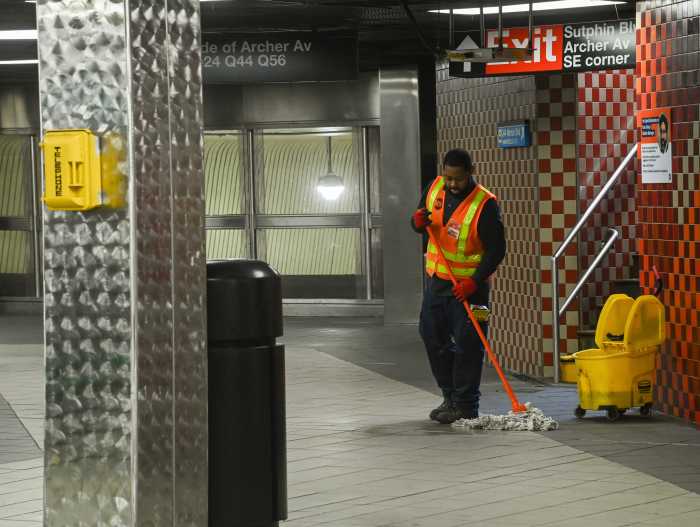When Pres. George W. Bush was asked to describe the type of jurist he would like to name to fill vacancies on the Supreme Court, he mentioned Associate Justice Antonin Scalia as an ideal model.
If Bush is still president when Chief Justice William Rehnquist retires, it would be highly surprising if he did not choose Scalia to be the court’s new leader.
That prospect, along with the fact that Bush would also be naming a new associate justice at the same time, should send a chill down the spine of every gay, lesbian, and transgendered American who considers the possibility that Democrat John Kerry might well not win this November’s election.
Churlish in his harshly conservative court opinions and all too eager to maintain his friendly ties to right wing groups, Scalia has always saved particular venom for gay rights claims and he was in high dudgeon last summer when the court overturned the nation’s sodomy laws.
“State laws against bigamy, same-sex marriage, adult incest, prostitution, masturbation, adultery, fornication, bestiality, and obscenity are sustainable only in light of Bowers’ validation of laws based on moral choices,” he asserted, referring to the 1986 ruling upholding Georgia’s sodomy statute. “What a massive disruption of the current social order, therefore, the overruling of Bowers entails.”
The gay and lesbian community recoiled at Scalia’s rhetoric, even as many of us privately credited him with understanding perhaps better than his peers the revolution in the legal perception of gays that the sodomy ruling heralded.
For much of the rest of the nation, however, a fresher take on Scalia emerged early this year when he declined to recuse himself from a court case that challenges Vice President Dick Cheney’s refusal to disclose the membership of an advisory task force on energy he chaired early in the Bush administration—even after news surfaced that the justice and the veep had gone on a hunting trip together in the fall. Scalia’s haughty and argumentative written explanation played into perceptions already out there––at least among that sliver of the American populace who pays serious attention to the high court––that he has an imperial, even authoritarian personality.
The recusal refusal, however, was relatively small potatoes compared to what went down last week––and a large number of Americans had better start paying attention.
Last Wednesday, Scalia spoke at the Presbyterian Christian High School in Hattiesburg, Mississippi, an event that was covered by only two reporters, one from the local newspaper, the other from the Associated Press, both at the school’s invitation.
As Bob Herbert reported in his New York Times column this Monday, both reporters sat in the front row, taking notes and also recording the speech to ensure accuracy in their reporting. The AP reporter told Herbert that 35 minutes into Scalia’s speech, the two journalists were approached by a deputy U.S. marshal providing security to the justice who insisted that they surrender their tape recordings, given Scalia’s long standing insistence that he not be recorded by the press. Both reporters resisted, and when the AP reporter explained that her machine was digital and therefore had no tape, both devices were confiscated and only returned later, absent any evidence of Scalia’s words.
News of this illegal seizure soon reached the ears of the Reporters Committee for Freedom of the Press, which immediately faxed a letter of complaint to Scalia’s chambers in Washington. In response, the justice claimed to be “as upset as” the Committee and disclaimed any authority over the actions of his security detail. He also sent letters of apology to the two reporters and indicated that in the future he would allow recording by the print media in order to “promote accurate reporting.”
Some might see this as a happy conclusion––both for the sanctity of basic constitutional protections and as a sign that Scalia has some humility, or at least some shame.
But how credible is a claim by a sitting Supreme Court justice that he was not responsible for the actions of a deputy marshal who was carrying out an edict against recording for which that justice is well known? To the extent that the marshal’s actions were illegal, it seems likely that they were undertaken at the implicit––and perhaps even overt––direction of Scalia.
A more disturbing facet of this resolution is Scalia’s insistence that he will continue to bar broadcast media from recording him, relying on “my First Amendment right not to speak on radio or television when I do not wish to do so.”
The justice ought to check the Constitution on that one. Once he grants some journalists the right to record his words, Scalia has acknowledged that he is acting in a public setting. To attempt to curb the ability of other journalists to similarly pursue their job duties would be a clear violation of the First Amendment rights of that second group of journalists.
Even a Supreme Court justice is not above the law, regardless of his pretensions otherwise.






























